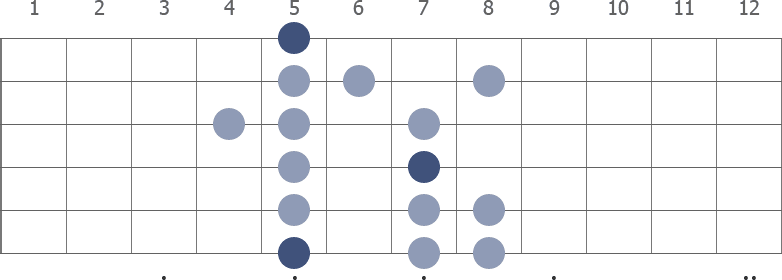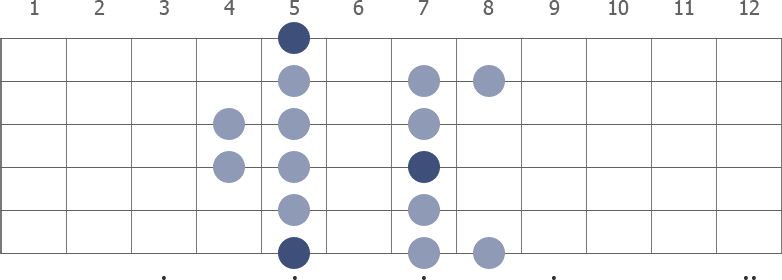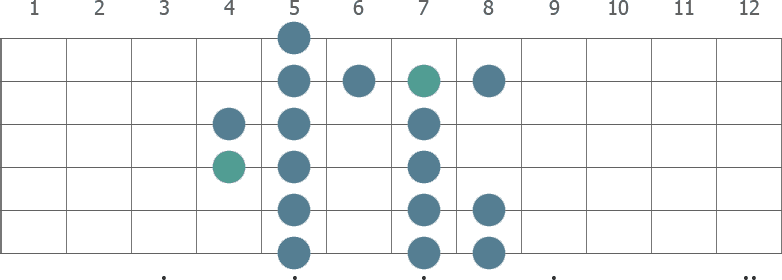Aeolian and Dorian comparison
The Aeolian mode compared to the Dorian mode with diagrams and explanation.
The Aeolian and the Dorian modes are seven-note scales. The scales are closely related: they are both minor sounding with a minor 3rd and only one tone differs (as seen in the comparing tables below).
A Aeolian scale degrees and notes.
| 1 | 2 | b3 | 4 | 5 | b6 | b7 |
|---|---|---|---|---|---|---|
| A | B | C | D | E | F | G |
A Dorian scale degrees and notes.
| 1 | 2 | b3 | 4 | 5 | 6 | b7 |
|---|---|---|---|---|---|---|
| A | B | C | D | E | F# | G |
Notes of the Aeolian and the Dorian mode in all keys.
| Scale | 1 | 2 | b3 | 4 | 5 | b6 / 6 | b7 |
|---|---|---|---|---|---|---|---|
| C Aeolian | C | D | Eb | F | G | Ab | Bb |
| C Dorian | C | D | Eb | F | G | A | Bb |
| C# Aeolian | C# | D# | E | F# | G# | A | B |
| C# Dorian | C# | D# | E | F# | G# | A# | B |
| D Aeolian | D | E | F | G | A | Bb | C |
| D Dorian | D | E | F | G | A | B | C |
| Eb Aeolian | Eb | F | Gb | Ab | Bb | Cb | Db |
| Eb Dorian | Eb | F | Gb | Ab | Bb | C | Db |
| E Aeolian | E | F# | G | A | B | C | D |
| E Dorian | E | F# | G | A | B | C# | D |
| F Aeolian | F | G | Ab | Bb | C | Db | Eb |
| F Dorian | F | G | Ab | Bb | C | D | Eb |
| F# Aeolian | F# | G# | A | B | C# | D | E |
| F# Dorian | F# | G# | A | B | C# | D# | E |
| G Aeolian | G | A | Bb | C | D | Eb | F |
| G Dorian | G | A | Bb | C | D | E | F |
| Ab Aeolian | Ab | Bb | Cb | Db | Eb | Fb | Gb |
| Ab Dorian | Ab | Bb | Cb | Db | Eb | F | Gb |
| A Aeolian | A | B | C | D | E | F | G |
| A Dorian | A | B | C | D | E | F# | G |
| Bb Aeolian | Bb | C | Db | Eb | F | Gb | Ab |
| Bb Dorian | Bb | C | Db | Eb | F | G | Ab |
| B Aeolian | B | C# | D | E | F# | G | A |
| B Dorian | B | C# | D | E | F# | G# | A |
Notice that C# is the same as Db, D# is the same as Eb and so on.
Scale diagrams
The scale diagrams show A Aeolian and A Dorian in two octaves (shape 1 in 5th position).
A Aeolian

A Dorian

Graphic comparison
The scale diagram shows Aeolian and Dorian modes merged (the added Dorian notes in light green).

Backing track
Since the Aeolian and the Dorian are quite alike, you can switch smoothly between these scales in solo playing. The main concept is to choose scale depending of the chord you solo over. Try this by playing over the track below. The song is in 4/4 time, 120 bpm and concludes 32 bars playing 2 times. Play A Aeolian over the first 4 bars, A Dorian over the next 4 bars and so on for the complete song.
Jam Track
Tempo (120 BPM)